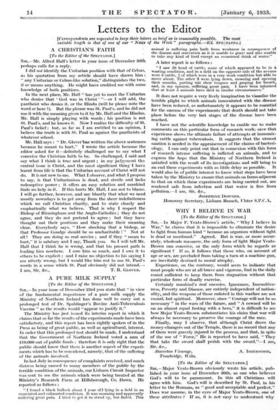Letters to the Editor
• [Correspondents are requested to keep their letters as brief as is reasonably possible. The most suitable length is that of one of our " News of the Week" paragraphs.—Ed. Seco. rs.roa.I
A CHRISTIAN'S FAITH
[To the Editor of the SPECTATOR.]
Sm,—Mr. Alfred Hall's letter in your issue of December 30th perhaps calls for a reply.
I did not identify the Unitarian position with that of Celsus, as his quotation from my article should have shown him : "any Unitarian or Celsus-like solution," distinguishes the two, if or means anything. He might have credited me with some knowledge of both positions.
In the next place, Mr. Hall "has yet to meet the Unitarian who denies that 'God was in Christ' "—or I will add, the pantheist who denies it, or the Hindu (will he please note the word or here ?). But the phrase was St. Paul's, and he did not use it with the meaning given to it by Mr. Hall and the Hindus. Mr. Hall is simply playing with words ; his position is not St. Paul's, and he knows it. Now I realize the difficulty of St. Paul's belief ; but, so far as I am entitled to an opinion, I believe the-truth is with St. Paul as against the pantheists of whatever school.
Mr. Hall says : "Dr. Gloveillas written the above sentences because he meant to hurt," I wrote the article because the editor asked for it—definitely challenged me to say what I conceive the Christian faith to be. So challenged, I said and say what I think is true and urgent ; in my judgement the central issue is Christ, and the most significant thing I have learnt from life is that the Unitarian account of Christ will not do. It is not new to me. What I observe, and what I propose to say, is that Unitarianism is dead, and sterile and lacks redemptive power ; it offers an easy solution and mankind finds no help in it. If this hurts Mr. Hall, I am not to blame. I will go farther, however, and say bluntly that what we need mostly nowadays is to get away from the sheer indefiniteness which we call Christian charity, and to state clearly and emphatically what we believe. That is why I respect the • Bishop of Birmingham and the Anglo-Catholics ; they do not agree, and they do not pretend to agree ; but they have thought out their positions and they make their meaning clear. Everybody says, "How shocking that a bishop, or that Professor Goudge should be so uncharitable ! " Not at all! They are doing us real service ; and if they "mean to hurt," it is salutary and I say, Thank you. So I will tell Mr. Hall that I think he is wrong, and that his present path is leading him nowhere. I owe him so much, and I owe it to others to be explicit ; and I raise no objection to his saying I am utterly wrong, but I would like him not to use St. Paul's words in a sense which St. Paul obviously did not intend.—




































 Previous page
Previous page